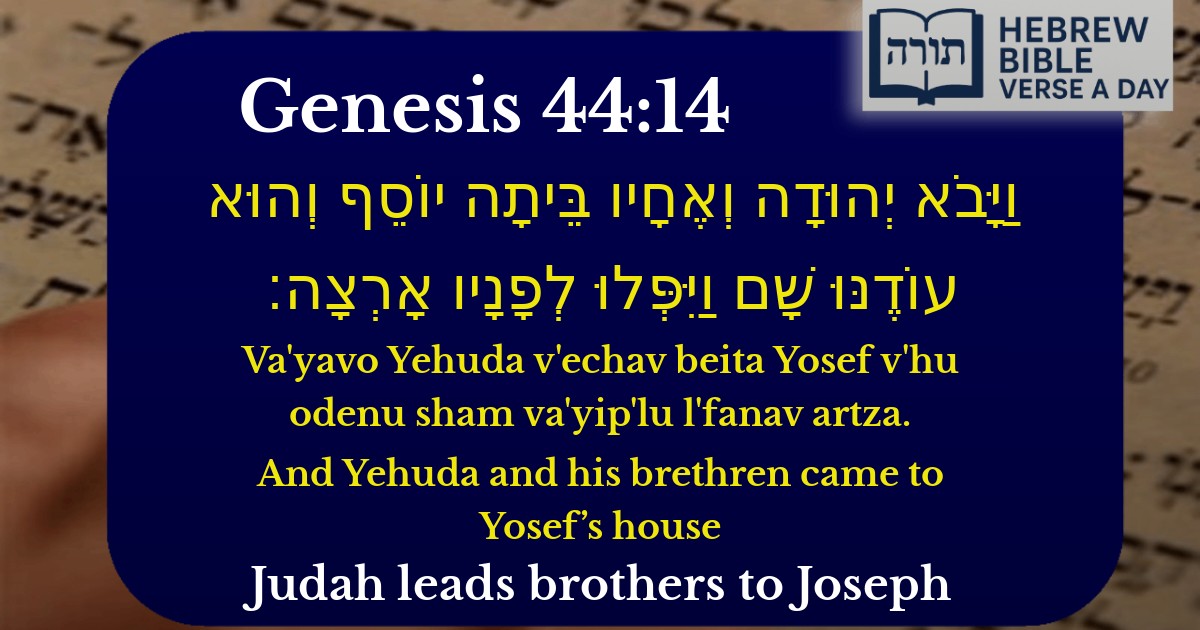Frequently Asked Questions
Q: Why did Yehuda and his brothers bow down to Yosef in Genesis 44:14?
A: In Genesis 44:14, Yehuda and his brothers bowed down to Yosef because they were fulfilling Yosef's earlier dreams (Genesis 37:5-11), where he saw his brothers bowing to him. Rashi explains that this was part of Hashem's plan to bring about the fulfillment of these dreams, showing that Divine prophecies ultimately come true.
Q: What is the significance of Yehuda leading his brothers in this verse?
A: Yehuda took the lead in approaching Yosef because he had personally guaranteed Binyamin's safety (Genesis 43:8-9). The Midrash (Bereshit Rabbah 93:6) teaches that Yehuda demonstrated leadership and responsibility, traits that later made his tribe worthy of kingship in Israel.
Q: Why does the Torah mention 'he was still there' when describing Yosef in Genesis 44:14?
A: Rashi explains that the phrase 'and he was still there' means Yosef had remained in his house waiting for them, rather than going out to his usual work. This shows Yosef's eagerness to see how his brothers would react when faced with Binyamin's apparent theft, testing whether they had repented for selling him years earlier.
Q: How does Genesis 44:14 connect to the theme of repentance?
A: This moment marks a key point in the brothers' teshuvah (repentance) process. The Talmud (Chagigah 4b) notes that a person is tested in the same situation where they previously sinned. Here, the brothers faced another opportunity to abandon a brother (Binyamin), but instead Yehuda stepped forward to protect him - showing they had truly changed from when they sold Yosef.
Q: What lesson can we learn from the brothers bowing to Yosef in this verse?
A: The Rambam (Hilchot Teshuva 2:1) teaches that true repentance is when you're in the same situation again but act differently. Here, the brothers who once scorned Yosef's dreams now bow to him, showing personal growth. This teaches that humility and recognizing truth are essential parts of spiritual development.


Context of the Verse
The verse (Bereishit 44:14) describes the moment when Yehuda and his brothers return to Yosef's house after the discovery of the goblet in Binyamin's sack. This occurs during the dramatic unfolding of Yosef's test of his brothers, where he seeks to determine whether they have repented for their earlier mistreatment of him.
Rashi's Explanation
Rashi (Rabbi Shlomo Yitzchaki) comments on the phrase "וַיָּבֹא יְהוּדָה וְאֶחָיו בֵּיתָה יוֹסֵף" ("And Yehuda and his brethren came to Yosef’s house") by noting that Yehuda is mentioned first because he had taken responsibility for Binyamin (as seen in Bereishit 43:8-9). Rashi emphasizes that Yehuda's leadership in this moment demonstrates his commitment to fulfilling his pledge to Yaakov.
Midrashic Insights
The Midrash (Bereishit Rabbah 93:7) elaborates on the brothers' emotional state when they prostrated themselves before Yosef ("וַיִּפְּלוּ לְפָנָיו אָרְצָה"). It compares this moment to Yosef's earlier dreams (Bereishit 37:5-11), where his brothers bowing to him was foreshadowed. The Midrash highlights the divine providence at work, showing how Hashem's plan unfolds even through human actions.
Rambam on Repentance
Rambam (Maimonides), in Hilchot Teshuva (Laws of Repentance), teaches that true repentance requires being placed in the same situation and choosing differently. Here, the brothers—who once sold Yosef—now stand before him (unknowingly) and demonstrate loyalty to Binyamin, showing their growth and change of heart.
Yehuda's Leadership
The Kli Yakar (Rabbi Shlomo Ephraim Luntschitz) notes that Yehuda's name precedes his brothers because he was the one who stepped forward to plead for Binyamin (as seen in the next chapter, Bereishit 44:18-34). This act of self-sacrifice and advocacy marks Yehuda as the progenitor of Malchut (kingship) in Israel, foreshadowing his descendants' future role.
Symbolism of Prostration